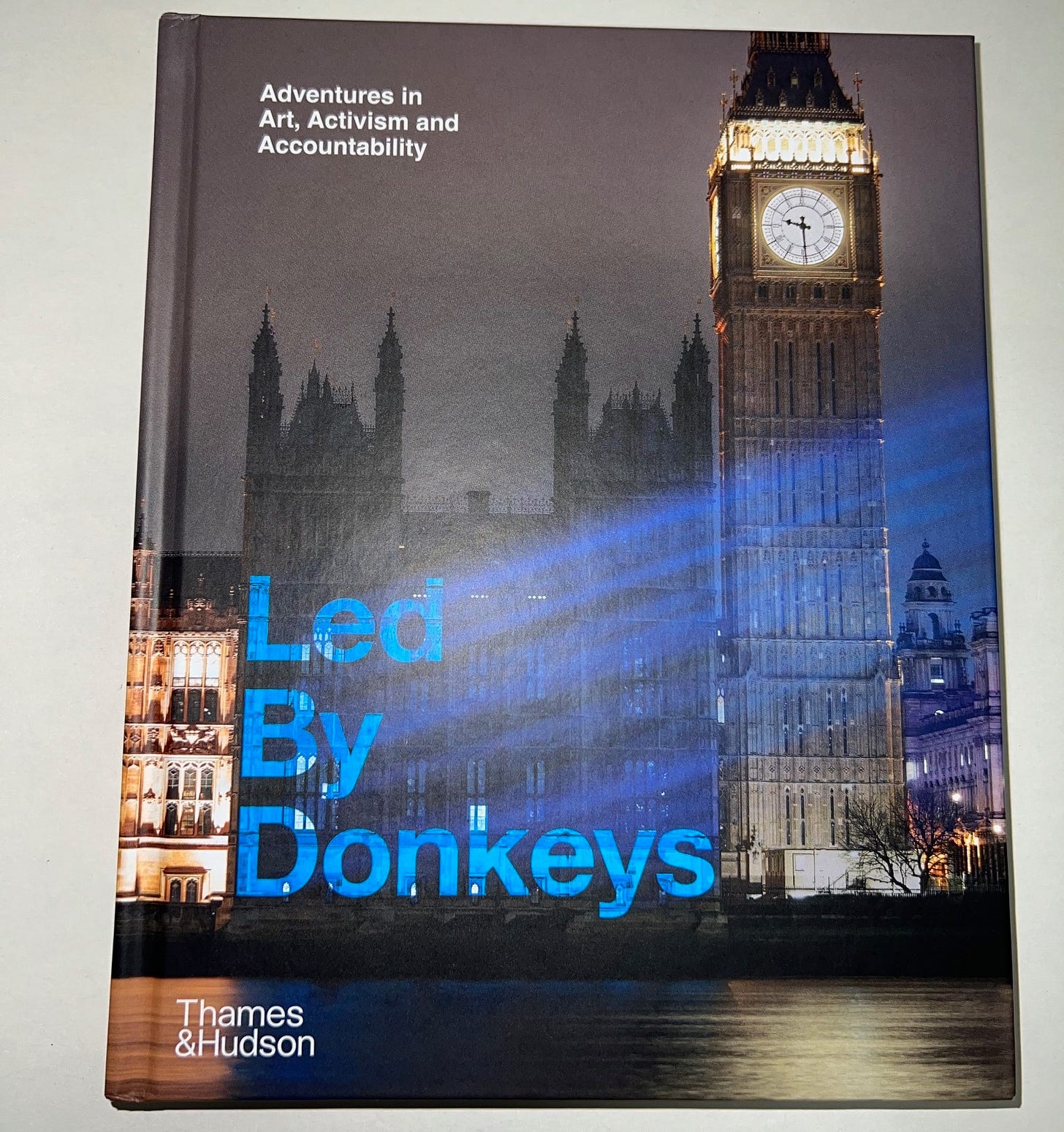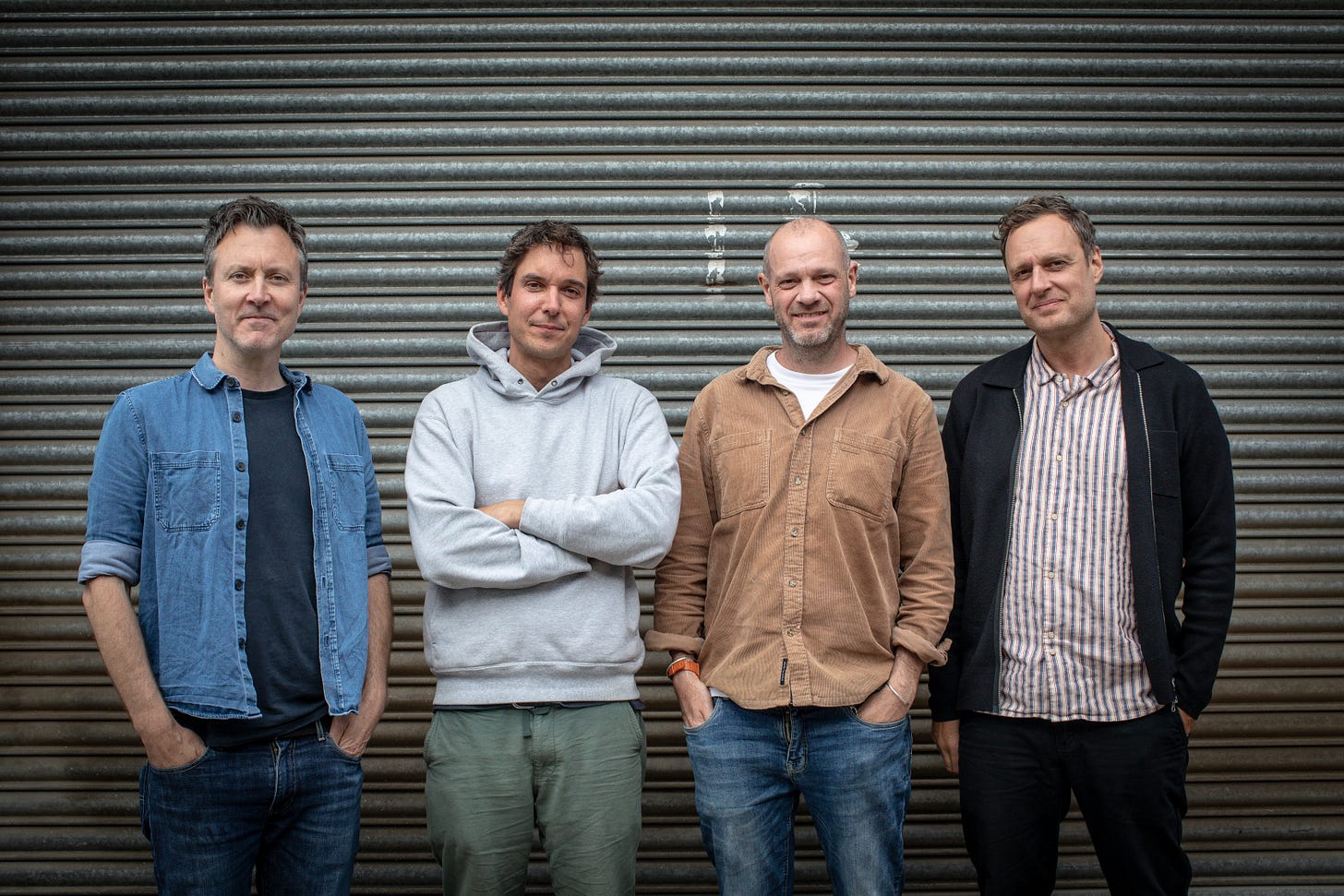The latest from 'Led by Donkeys' + Are we on the cusp of fascist Britain?
Two related and contrasting topics in today's THE LEFT LANE.
Note to those reading via email: This article may exceed the length that can be sent by Substack. In which case, please click on the headline (The latest from …) and it will take you directly to the Substack article. Or click on “View Entire Message.”
There are two guest posts in today’s THE LEFT LANE. One is a review of a just-published book from ‘Led by Donkeys’ and the second one argues that ‘Stand up to Racism gets it wrong about fascism.’
It is good to see Led by Donkeys is keeping at its “old tricks.” Our cover photo shows a billboard just erected in the Essex constituency of Clacton that Reform UK leader Nigel Farage won in the general election. The group has a six-month lease on the location.
Adventures in Art, Activism and Accountability -A review
By Steve Pitchford (GUEST POST)
I was delighted when a review copy of the new Led by Donkeys book arrived on my doorstep. Gripping the book, I turned to my wife, eyes alight. I imagine I had a similar level of excitement to when I was seven and Santa gifted me dig-dug. The look on her face suggested that she didn’t carry quite the same level as enthusiasm for the work as me…
“Are you aware of who Led by Donkeys are?” I asked.
“Not really,” came the reply.
“Well..” I started… “They are a protest group”.
“Like Extinction Rebellion or Fathers for Justice?” my wife replied.
“Not really, no… it started during Brexit, but became something bigger…They’ve taken protest to the level of art. They’ve done for political protest what Banksy did for street art. Perhaps something different. They’ve turned protest, and the demand for integrity and accountability into an art form. Performance art.”
The conversation soon changed subject, and I was left on the couch with the book. Happy.
So what’s the book about?
Taken at face value, the title “Adventures in Art, Activism and Accountability” suggests Led by Donkeys has succeeded in blending performance art and protest. These works have taken various forms. Platforms include billboard and projection, with imagery, stunts and film forming output. Creative has ranged from damning satire to more poignant works, aiming to capture the popular mood. The book reflects this. Highly graphical, it showcases the creative output and collaborations since the group’s inception in 2019. Loosely arranged into chapters, one for each year, it runs to 2024, closing before the General Election which saw the Tories conclusively moved onto the opposition benches.
It’s a book with its roots in art. From cover to cover, the material is beautifully presented. In every positive way, it could be described, at least in spiritual terms, as an activists scrap book. Over 200 pages, predominantly of images capturing the campaigns and collaborations by the group. There is just enough written content to capture the context of the work, together with insights into the planning and execution of some of the campaigns. Wonderful detail like the choice of the paint used for one protest, or the effort to adjust the typography of another add a personal touch to a series of campaigns that successfully captured public interest and highlights the need for transparency and accountability in government.
The administration of Britain by the Tory Government from 2019 to 2024 is worthy of documentation. Adventures in Art, Activism and Accountability captures this period in an innovative and engaging form. The result is both a damning indictment of government, and by extension, the establishment and a poignant celebration of protest. The book’s deceptively simple format creates a platform for reflection as well as inspiration. This is a period, after all, that saw Brexit, Covid, the war in Ukraine and a new wave of terrible events in Israel and Gaza.
Projection onto White Cliffs of Dover commemorating Brexit.
Those familiar with the group’s work will know the background story. Led by Donkeys launched with a guerrilla billboard campaign highlighting perceived hypocrisy and double standards behind the Brexit campaign. The transition from a grassroots campaign to a movement provides early insight into the success of the group. The book describes an insightful moment when the group realised that to campaign for transparency and accountability from a position of anonymity presents an unhelpful dichotomy. The subtle notes in the back story suggest that this is a group which has blended strategic insight with tactical nous.
With a huge majority, Boris remained safe despite the Remainer / Brexiteer rift that still plagues the UK. The story was to change, however. As the response to the Brexit is settling, the countries response to Covid begins. The lockdowns provide a challenging air for protest.
It’s to the credit of the group that they continued. To pause and reflect on wider society, rather than the book, it’s hard to put a finger on when public and establishment opinion turned so violently on Boris Johnson. Was it Barnard Castle, the tinsel and party atmosphere at Downing Street, or the realisation about the real impact of Covid policy? A pivotal image for some was the picture of HRH Queen Elizabeth mourning the loss of Prince Philip, seemingly alone.
This context is important to consider, but it’s understandable that it’s absent from the book. This is, after all, the story of a campaign group, rather than a government.
While Led by Donkeys cannot claim credit for the downfall of Boris Johnson, they should be credited with acting as a catalyst for a movement that supports change in UK governance. Unfortunately for the British people, the removal of Johnson could not sweep clean his adminstration’s impact on British politics. As with the transition from Brexit to Covid, the realisation of widespread maladministration, particularly around the purchase of PPE presented fertile soil for continued campaigning.
The year 2021 begins with a particularly poignant section on a poignant reminder of the human cost of Covid, and Covid policy. A collaboration with the group Covid-19 Bereaved Families for Justice led to the creation of the National Covid Memorial wall; see it here. It makes for difficult reading, in a very positive sense.
In the aftermath of Covid, the extent of Downing Street parties became public knowledge. Public faith in governance was damaged further by the disastrous mini-budget of Liz Truss. The perceived anointment of Rishi Sunak as leader of the country did little to settle public sentiment. Led by Donkeys expanded their vocabulary. Topical, tactical campaigns were maintained, but collaborations and range of targets of campaigns increased. Sir Keir Starmer does not escape the lens. Highlighting that accountability is not a party specific problem, Adventures in Art, activism and accountability provides backstory and context to a protest highlighting the Labour leader’s notorious U-turn on voting reform and his opposition to proportional representation.
The Covid Fast line and its beneficiaries also get a mention. Collaborations with the Good Law Project set the scene for a dramatic, international act of protest, involving tracking down Michelle Mone’s luxury yacht. If you are unaware of Michelle Mone, her relationship with British Politics and the VIP fast lane, research is time well invested. You could start here.
The back story to the renaming of the boat, “Lady M”, in Spain is a blend of insight into an elaborate protest, set against work on a number of different campaigns. Many groups would be satisfied with one target in a year. It would be an exaggeration to suggest Led by Donkeys make managing multiple campaigns look easy. They have however, clearly developed capability for substantial output.
Highlighting Michelle Mones Baroness Mones’ reported role in PPE VIP lane.
Adventures in Art, Activism and Accountability captures the output of Led by Donkeys, and adds sufficient backstory and context to provide benefit over and above what you may have seen shared on social media.
There’s a few ways to conclude a book review. For this, let’s consider the takeaways, and whether the book is a worthwhile purchase.
The second question is the easiest to answer. If you can spare the cash, Adventures in Art, Activism and Accountability is a worthwhile purchase or gift for anyone interested in activism or progressive politics. The book gives a behind the scenes view of a number of campaigns which captured public interest, and acts as a critical lens on a significant period of British politics.
In terms of lessons learnt, the development of Led by Donkeys as both a group and a brand is significant. A common theme throughout their campaigns is simply holding power to account. In doing so, the cause has come first. Capabilities were built. Connections gave rise to collaborations which were greater than the sum of their parts.
To what extent Led by Donkeys has facilitated political change may be a fitting subject for debate. Their contribution towards informed democracy, and demonstration of the importance and relevance of peaceful protest may serve as an exemplar for years to come.
Oliver Knowles, James Sadiri, Ben Stewart & Will Rose AKA "Led by Donkeys"
Led By Donkeys: Adventures in Art, Activism and Accountability. Thames and Hudson. Sept. 2024
++++
Here are the dates and locations of the LED BY DONKEYS autumn book tour.
Steve Pitchford is a reader of THE LEFT LANE who lives in Birmingham.
zzzzzz
Stand Up To Racism gets it wrong about fascism.
By John Tummon (GUEST POST)
Tommy Robinson at a far right demo in June 2024.
Many left-wing webinars have been organised to address responses to the early August street-level disturbances instigated by far-right social media influencers. A significant amount of writing has also emerged on this topic. In the aftermath of the violence, two consecutive issues of Socialist Worker were dedicated almost entirely to advocating for the building of Stand Up to Racism. This effort follows a decision by the Socialist Workers Party to attempt to replicate the success it achieved 40 years ago with the Anti-Nazi League.
This piece evaluates this coverage, questions whether the often emotively used term “fascism” is being applied correctly, and revisits a campaign in Oldham from two decades ago aimed at challenging the rise of the far-right British National Party (BNP).
Fascism may, of course, one day emerge in the UK. We will not, however, be prepared to recognise and oppose it if we mistakenly cry “WOLF!” today.
A brief word on terms:
1) Socialist Worker (SW) is the weekly newspaper of the Socialist Workers Party (SWP), the largest and most-longstanding Trotskyist party in the UK. The SWP was formally created in 1977. In 2023, it had an estimated 2,000 financial supporters/ members.
2) Stand Up to Racism (SUTR) is a front group of the SWP and was set up in 2016 after the Brexit Referendum. Some activists label SUTR the SWP’s “recruitment agency.”
3) The Anti-Nazi League (ANL), a precursor to SUTR, was set up in 1977 by the SWP as a front group to oppose the growth of the far right. The SWP wound it up in 1981.
To return to Socialist Worker. More recent issues have all reported on SUTR initiatives as if these are the totality of the response to the challenge of the early August street violence against asylum seeker accommodation, immigration advice offices and some Mosques. This is not the case, much as the SWP is striving to make it so.
The prevalence of Palestinian flags at all of the protests held in the aftermath of the early August street violence indicates that the mass movement of support for the struggle of the Palestinian people extended its activity to protesting against the attacks on asylum seeker hotels, immigration advice centres and Mosques, precisely because opposing racism is at the heart of supporting Palestinians. Many in this movement have painful personal experiences of racism. SUTR played a minor role, but it aims to replace the pro-Palestine movement as the leading anti-racist and anti-fascist movement.
If SUTR succeeds, this will likely split the domestic from the internationalist anti-racist forces because, in the first place, SUTR allows the carrying of Israeli flags at its events. (Very strange politics to permit flying the flag of a racist and apartheid state at an anti-racism march.) SUTR has also, on at least one occasion and as documented in a video, tried to prevent a Palestinian woman from speaking at a SUTR rally in Oxfordshire about her family in Gaza. In short, SUTR becoming dominant like the ANL was four decades ago would weaken anti-racism efforts significantly.
“FASCIST RIOTS … ACROSS BRITAIN “
The SWP / SUTR analysis of the challenge is clear from its latest leaflet which comes from the same source: “FASCIST RIOTS HAVE TAKEN PLACE IN TOWN AND CITIES ACROSS BRITAIN.” SUTR’s depiction of the forces that carried out the August street violence as “fascist” has been consistent; their speakers echo this same message at rallies. The same SUTR leaflet urges “all those who oppose this must join in a mass movement powerful enough to drive back the Fascists”.
Much as I dislike imprecise terms like ‘The Far Right’, ‘The Hard Right’ and ‘Right-wing Populism’, the idea that we urgently need to drive back a growing fascist movement is nonsense.
We are not living through a prelude to the 1936 Battle of Cable Street . Oswald Moseley’s British Union of Fascists (BUF), John Tyndall’s National Front (NF) and Nick Griffin’s British National Party (BNP) were all fascist groups with a membership and internal structure.
By contrast, Tommy Robinson’s English Defence League (EDL) is no longer a political organisation with a distinct membership. John Meighan’s Football Lads Alliance never has been more than a social media tool to get bigoted and right wing football fans involved in political events. Robinson is now basically a freelance ‘Influencer’ who, along with Nigel Farage, has always loomed far larger than the various parties he has led. Of course, we should be alert to the danger that this situation could change.
‘Dog Whistle blowing’ and continually pushing the right wing narrative and culture wars is what links Farage and Robinson. While Robinson is also an ‘Influencer’ pushing broadly the same ideology, he is much more of a non-respectable ‘rabble-rouser’ than Farage and his mates.
To this extent, Robinson exists politically outside the ruling class. But this does not make him a fascist leader, even though individual fascists turn out at his rallies and were undoubtedly present in the early August disturbances (for which several have been sentenced and their political backgrounds laid bare.)
Exerting influence through mainstream mass media and social media, not through building well-organised fascist movements for supporters to join, is how the Right works at the moment. It partly succeeds due to this combination and because it feeds off the mainstream political and media narrative.
THE LEFT HAS A FASCISM PROBLEM
Underpinning all this is the fact that the Left has a FASCISM problem which is unfortunately not new. Fascism is an over-used term that is too often flung, in ignorance, at people who oppose some cherished political position that some of us hold. It is a tactic which came originally from anti-fascist activity. ‘No Platform for Fascists’ is increasingly used to stop non-fascists --- with whom some may strongly disagree --- from accessing a public platform to air their views.
Then there is the notion that fascism is some kind of phenomenon that reappears and gains traction during crises of the capitalist system, ready for a distraught and panicked ruling class to reach for it, in order to save capitalism from the working class uprisings / forces of the Left (we should be so lucky!).
Finally, there are Trotskyists who insist that fascist movements do not appeal to the working class, but mainly to the ‘Petty Bourgeoisie’. Why? Because Trotsky said so. None of this is historically accurate, nor does it stand up to the latest sociological research.
A 16 September article in Chartist titled ‘Rancour on the Right’ reported a class, gender and age analysis of those who voted for Reform UK in this year’s General Election. Based on research carried out by YouGov, it shows strong working class, male and pensioner support for Reform. Reform UK’s popularity, with over 4 million votes, was greatest among older, poorer, and less-educated (in a formal or academic sense) sections of British society: 18% of the 60-69 age cohort voted for Reform UK, compared to 9.5% of the 18-29 age group. 20% of Reform’s support was from the working class, compared to 11% from the middle and professional classes. Educationally, 23% of those with GCSEs (or no academic qualifications), that is, who had left school at 15 or 16 voted for Reform UK, compared to 8% of those who had a university degree. There was also a gender difference, with 17% of men supporting Reform UK compared to 12% of women.
REFORM AND FAR RIGHT RIOTERS HAVE SAME PROFILE
Putting this together with the news filtering through of those sentenced for their part in the August disturbances, I think that we can broadly extrapolate this same profile of support for Reform to those who turned out on the streets to attack Mosques, asylum seeker accommodation and immigration law practitioners’ premises. So, either Trotsky’s Petty Bourgeoisie thesis is historically specific to between the World Wars, or taking to the streets in support of the views of Farage and Robinson is not fascism.
I suspect both are true. Middle-aged and older working class men, as well as angry young working class men, are more likely to be drawn to Robinson’s rabble-rousing than any other groups. Denouncing such people as ‘fascists’ is not just wildly wrong, but also amounts to the Left turning away from trying to engage with working class people because of their ‘false consciousness’.
The first thing to understand about fascism is that, compared to other political systems and movements, it is ---along with representative democracy--- very much the new kid on the block. It is only a little older than Islamism. All date from the first half of the twentieth century, so assuming that fascism is an inevitable or recurring feature of the capitalist epoch is simply not so. (As we know, fascism emerged first in Italy about a century ago.)
Socialism is a hundred years older than any of them and authoritarianism, which the world seems to be slipping into right now, is by far the oldest political system. All empires have been authoritarian, as were feudalism and absolutist monarchy. Racism has a similarly long lineage, dating back at least to the slave system on which the Roman Empire was built.
Marx wrote that history repeats itself as farce and it is farcical to assume capitalism will necessarily reach for fascism to safeguard it against this latest capitalist crisis that is undoing it politically in this era. It was tried in the 1920s and 1930s. Back then it neither defeated the working class permanently nor ensured that unbridled capitalism could implement a full throttle free market.
In fact, after World War II, Eastern Europe moved outside the capitalist realm. So did China and western capitalism had to compromise with the working class through welfare states and mixed economies. The USA had to use the Marshall Plan to bail out France and Italy to stop their Communist Parties from taking control.
CAPITALISM HAS BUILT IMMENSE COERCIVE POWER
Crucially, all advanced capitalist states have taken great trouble throughout the neoliberal period to build up an immense coercive power, not only in military spending, but also in police forces equipped to quash protest and even the biggest strikes. As well, laws cutting back massively on civil liberties & outlawing many forms of industrial action have been enacted. And these are linked together with a rapidly escalating censorship, and judicial systems and judiciaries practiced in handing out draconian sentences. Just look at the 4-and 5- year prison terms recently handed out to non-violent anti-climate change protesters.
In short, the capitalist class now feel far more confident in riding out any class struggle at both the economic and political level than was ever the case in the 1930s. Back then, Churchill saw fascism as the ultimate defence against communism and went out of his way to applaud Mussolini’s struggle against ‘the bestial appetite and passions of Leninism’.
But 21st century state managers do not need to consider the fascist option, with all its attendant risks, unless they feel far more under threat than they do today. At its recent conference in Manchester, for example, the Green Party shamefully never even mentioned the jailing of the five Just Stop Oil activists.
A further part of the Left’s fascism “problem” is its reluctance to take on the actual policies of the extreme right or to engage and contest the underlying tropes and narratives that some people seem to believe in. In the midst of economically impoverished and politically abandoned towns and some cities in England, there is no political alternative to the right wing narrative. That narrative is to blame the ‘other’ for poverty, for the meaninglessness of Westminster politics, for the growing sense of alienation, for the social problems all around which have been consistently peddled over several decades by mainstream politicians and the media. There is no significant working-class socialist movement providing a credible alternative, so racism can thrive.
CHALLENGING THE BNP IN OLDHAM
Until 2009, I was the Director of the Oldham Race Equality Partnership (OREP) and had been for 6 years, during which time we worked with community activists on white-majority estates to successfully undermine the support for the BNP. We convinced these communities through our consistent work with them that we had more to offer than the BNP did. In fact, as a result, we ended up with more white community activists than ethnic minority representatives on the organisation’s board.
Over the years, we quartered the BNP vote in their main target wards The BNP was also subsequently defeated in the St Helens ward in Barnsley by working with and through deeply-rooted local community activists. Yet, even a community engagement anti-fascist strategy can only go so far on its own without putting an alternative social vision and political programme to people who got absolutely nothing from the vision of society featuring economic growth and a globalised, free-market capitalism.
The curious thing about anti-fascist campaigning is that it fails, today as in the past, to provide space for anti-racist campaigning. The reason for this is presumably so as not to dilute the ‘Nazi’ argument, but it is not doing anyone any favours.
A VEHICLE PRIMARILY FOR RACIST SENTIMENT
Robinson and Reform UK, like the BNP before them, are, in essence, a vehicle for racist sentiment rather than for fascist sentiment, for racist policies rather than for fascist policies. We need to fight it on each and every one of these, line by line.
The extreme right will be defeated ideologically when we defeat the racist arguments it puts forwards and the narratives it depends on ---- and echoes ---- and, to do this, we need to put forward a comprehensive alternative. There are no short cuts.
+++++
John Tummon from the Greater Manchester area is a long-time political activist on the left….and also a reader of THE LEFT LANE.
+++++++++++++
Got an idea for an article? Send a 50-word summary to: the leftlanepolitics@gmail.com
++++++
Edited by Alan Story, THE LEFT LANE is a reader-supported publication. To receive new posts and support our work, consider becoming a free or paid subscriber: http://theleftlane2024.substack.com/subscribe
You can reach us at: theleftlanepolitics@gmail.com
You can read all previous columns of THE LEFT LANE here
Follow us on our new THE LEFT LANE Instagram











